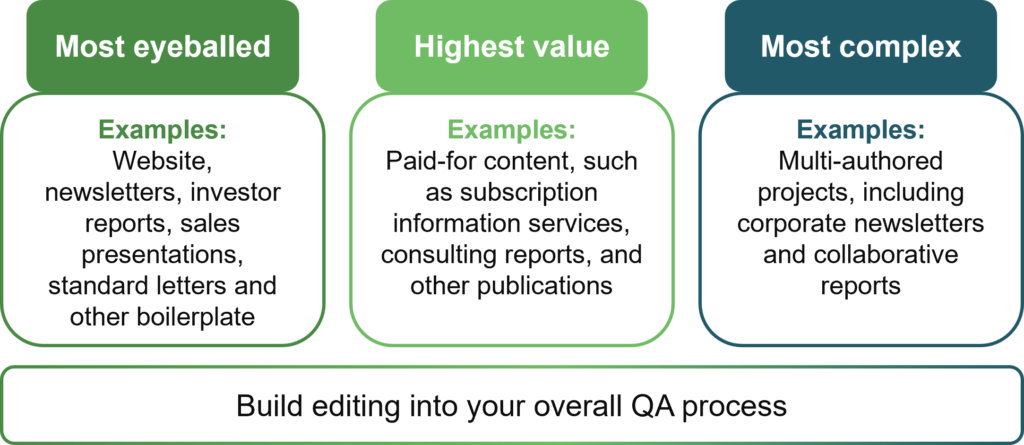An editor can add value to any type of business writing, including web pages, presentations, standard documents, proposals, and reports. Editing helps you communicate more effectively, for example by improving a document’s logical flow and readability, and correcting any spelling and grammar errors. It’s good for business.
Despite this, many companies are missing out on the upsides of working with an editor. Where is the best place to start? We recommend focusing on the business writing that is the most eyeballed, the highest value, and/or the most complex. These three areas are likely to be where an editor can have the biggest impact. Begin with one of these and build from there. In tandem, consider making editing part of your broader quality assurance (QA) process.

Ask an editor to review your most eyeballed content
Your website, newsletters, investor reports, sales presentations, standard letters and other boilerplate are just some examples of high-visibility external communications. All this content needs to do its job in the most effective way. Clarity, readability, accuracy, appropriate tone, and consistent branding are musts.
Some of this content (e.g. web pages, corporate presentations, boilerplate) is evergreen, meaning it gets reused over an extended period before being refreshed. This sort of material warrants particular attention, as it will receive many eyeballs. The same applies to some ephemeral content too, such as newsletters that many customers will read.
An editor can help optimise your most frequently used documents for their envisaged readership, so that each performs its intended purpose in a distraction-free way.
Hire an editor for your paid-for content
Customers have high expectations of paid-for content, such as subscription information services and consulting reports. Such deliverables must be well organised, clearly argued, and attractively presented. Nothing else will do. Hiring a substantive editor and/or copyeditor to work on high-ticket items can provide an extra layer of quality assurance to help ensure your output is always of a high standard.
Bring in a substantive editor for multi-author collaborations
Multi-author collaborations are common in the workplace. You may publish a newsletter that includes contributions from across your organisation. Or produce long-form reports that several authors work on collectively. Bringing together these sorts of content really benefits from a skilled editor. For example, an editor can cut over-long articles to fit a newsletter’s space constraints, as well as performing all the usual editorial checks. For multi-authored reports, editors can advise on the content structure and provide other guidelines, so that the individual contributions come together as a coherent whole. An editor can also ensure that the final report is internally consistent and reads with a single voice.
Make editing part of your overall quality assurance process
Editing aims to enhance the quality of a document, by improving its accuracy, clarity, conciseness, consistency, and coherence. In the business world, editing can work well with peer reviewing as part of an overall QA process. The two roles are complementary: the peer reviewer brings their topic expertise, while the editor is skilled in shaping the content in line with its overall goals. For many types of document, and particularly for complex, long-form content, an editor is ideally involved from the project’s get-go. This helps avoid major changes to the document structure later on. However, some organisations wait until the full draft stage to bring in a copyeditor. The choice is yours.
Summary
An editor can help improve all types of business writing. As a starting point, we recommend:
- Asking an editor to review your most eyeballed content, such as your company website, marketing presentations, and boilerplate text.
- Hiring an editor for your paid-for content.
- Enlisting a substantive editor for multi-author projects.
- Making editing part of your company’s overall QA process.
Before you go
If you would like to find out more about how an editor could help your business, contact us to book a discussion.
Editing and peer reviewing work well together as part of an overall quality assurance process.
